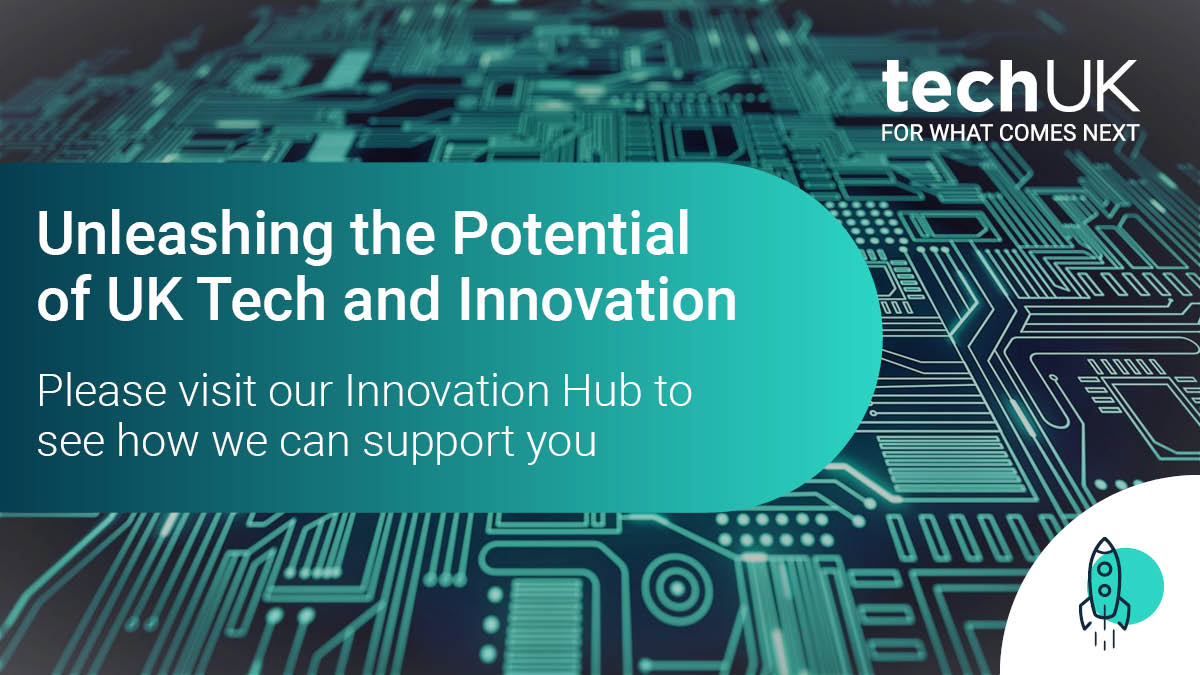Event round-up: What does it mean to be a science and technology superpower and how do we succeed?
techUK’s Head of Tech and Innovation Laura Foster was delighted to be joined by a fantastic panel of industry leaders:
- Anna Sutton, CEO & Co-founder, The Data Shed
- Dr Keith Dear, Director Artificial Intelligence, Fujitsu
- Stephen Pattison, Vice President Public Affairs, ARM
- Rosa Wilkinson, Director of Policy, High Value Manufacturing Catapult
You can watch the full session below. Please note the session starts at 35 minutes. Before this session there is a 30 minute fireside chat hosted by techUK as a debrief on the Spring Budget alongside PragmatIC Semiconductors, Wayve, and NCC Group.
What does it mean to be a science and technology superpower?
This broad term, echoed by UK Government throughout various Government strategies including the Integrated Review, or the more recent Spring Statement, as well as cascades of speeches from ministers & Government Representatives alike. More recently, this has underpinned announcements around the new Department of Science, Innovation and Technology – the UK’s foundation from which “to deliver the UK’s most innovative economy in the world” – its complementary Science and Technology Framework, and individual technology strategies such as the National Quantum Strategy.
The rhetoric is set, but the ambition – what does it actually mean to be a science and technology superpower – and how this will be achieved by Government remains to be fully understood. As such, Each panelist was asked what this term meant to them. Keith Dear explained in his previous capacity as a Government Advisor that ‘superpower’ was meant, at least in part, to be a rhetorical device that can be leveraged to ignite support for a sustainable science and technology ecosystem, and position its criticality to UK society and economy. In this sense, superpower is an educational process, not finished product. Keith described that in many ways superpower as a rhetoric device has been successful in urging Government to think strategically about investment into science and technology and building a greater awareness around the UK’s science and technology ecosystem.
This certainly does not mean that science and tech superpower is without ambition, and Keith emphasised what is now missing is the smart strategy that comes behind this rhetoric. This will require addressing several multi-layered and long-standing challenges while concomitantly opening pathways within Government to support pioneering innovation. Rosa made it clear that this ambition means to be a nation that can conduct the best research in the world and then, crucially, translate research into meaningful products and services that address large problems from healthcare and climate. In other words, as articulated by Stephen, it is more than knowing the ingredients, it is about developing the recipe. This was the first mention of applied innovation that became a significant theme throughout the remaining discussion.
As the conversation progressed from definitions, it was emphasised that innovation is constant and iterative. To keep pace with this persistent change, the UK needs to transform society to be more receptive of innovation, adoption, and then further re-invention. Stephen argued it is bout making sure the UK as a whole is more supportive of tech and driving the tech sector forward. Here, the discussion turned to skills and tech literacy as a strong foundation that will accelerate the UK forward.
There is no growth agenda without long-term skills development. The panellists highlighted a need for greater tech literacy across the whole population. This does not mean that everyone needs a technology background, and the panellists discussed the role of emerging technologies such as generative AI to democratise access technology itself. However, modular courses and upskilling could be critical to fill the key skills gaps facing the UK workforce. techUK has previously recommended through the Sir Michael Barber review that UK Government should review how it supports this kind of retraining and where additional funding can be used to encourage the wider use of bite-sized industry-led training designed to fit around the learner and their life. Stephen highlighted that the previous technology revolutions were led by apprentices, especially those training to apply their knowledge to their market, and the UK could do so much more to support apprenticeships to push forward applied innovation that is so critical to become a science and technology superpower.
The panelists agreed that upskilling the UK should be complemented by attracting international talent. UK businesses should have the opportunity to employ the brightest people no matter where they are from and migration is critical to delivering continued innovation, competitiveness, and employment opportunities in the UK. However, the skyrocketing prices of visas is a disincentive for firms and damages the UK’s competitiveness a as location to base a business. In comparison with Australia, France, Germany and Canada, the UK’s visa fees are significantly more expensive and this is an increasing disincentive for innovation.
Finally, business education was described as key for applied innovation and, in turn, improved economic growth. This was especially true for SME’s and there is a critical role that needs to be played by Government to help smaller businesses understand how to apply innovation strategically. While it was praised that there were different UK Government schemes, these are not joined together. Rather, Rosa made it clear that Government needs to better network and signpost their support for small businesses, and these different initiatives need to develop pathways to work together.
Anna also emphasised that innovation is not equitable at a geographic level and certain barriers are pervasive in regions outside of the South East, including better connectivity to the nations and regions.
As part of challenges facing the rest of the UK, VC capital outside of London was discussed as a significant barrier. The panelists explored how support could be given to develop channels between VCs and innovative businesses in different regions. Innovation clusters that could play to the particular strengths in different regions could both develop regional economies and address critical challenges in set areas such as skills, infrastructure, and the critical finance and investment highlighted by the panel. This critical conversation is continued by techUK’s Local Digital Capital Index that describes the impact and value technology can bring to a region, showcasing its strengths and providing direction for development. It highlights the challenges facing set regions around innovation and can help policymakers better support local tech ecosystems. This campaign will be working closely with the nations and regions work at techUK to ensure that innovation is equitable across the UK.
As the discussion turned to what the future of the UK may look like, the panelists noted that applied innovation and a wider move towards re-industrialisation would define UK innovation for the coming years. With this in mind, Government-led industrial initiatives will be critical, and it will no longer work for Governments to take a laissez-faire approach to innovation. However, this will need to be balanced with strategic intervention from where Government could make the biggest difference without overstretching governmental capacity. Here, engaging the private sector will be crucial and UK Government should work with private sector to develop novel solutions to large challenges facing the UK. Finally, the panelists highlighted that regulatory sandboxes could be an untapped solution for Government to create the environment to trial latest innovations with a consortium of industry, academia and government
However, Government support should not necessarily equate to more strategies. While it should be praised that the Science and Technology Roadmap and the new Department of Science, Innovation and Technology have brought together several strategies under the science and tech superpower narrative, in a year before an election the panelists were hesitant about how much certainty or long-standing investment into technology ecosystems this could bring. Both Government reform with the creation and DSIT and Labour’s interest in an industrial strategy showed bipartisan support for the UK tech sector which was strongly welcomed by the panelists. However, both parties should focus on consistency to send positive signals to UK industry. Or, as said by the panel, it is all about stability, stability, stability.
As the discussion drew to a close, each panelist relayed the message they would like to leave the audience with. Keith underscored that science and tech superpower is not an end result, but a process to get Government thinking strategically about investment into science and technology, raising the importance of technology within Government, and provide a means to address some longstanding and systemic challenges facing the UK technology ecosystem. In her final remarks, Anna was clear how critical it is to get real about implementation and deliver stability for UK businesses. Agreeing, Stephen emphasised the need for consistency and less talk in favour of more action. Finally, Rosa called for the UK’s technology ecosystem to connect together so we can deliver the greatest impact.
techUK would like to thank the wonderful speakers for an exhilarating and enjoyable panel, and we look forward to working on this campaign together in the near future
techUK – Supercharging UK Tech and Innovation
The opportunities of innovation are endless. Automation, IoT, AI, Edge, Quantum, Drones and High Performance Computing all have the power to transform the UK. techUK members lead the development of these technologies. Together we are working with Government and other stakeholders to address tech innovation priorities and build an innovation ecosystem that will benefit people, society, economy and the planet - and supercharge the UK as a global leader in tech and innovation.
For more information, or to get in touch, please visit our Innovation Hub and click ‘contact us’.

Sign-up to get the latest updates and opportunities across Technology and Innovation.
Keen to learn more? Get in touch:











